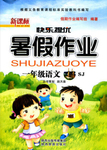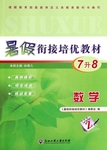题目内容
One of her lungs is ______ so that she has to rest.
- A.effected a little
- B.affected a little
- C.effected little
- D.affected little

 新课标快乐提优暑假作业陕西旅游出版社系列答案
新课标快乐提优暑假作业陕西旅游出版社系列答案 暑假衔接培优教材浙江工商大学出版社系列答案
暑假衔接培优教材浙江工商大学出版社系列答案 欣语文化快乐暑假沈阳出版社系列答案
欣语文化快乐暑假沈阳出版社系列答案Wendy Gallegos writes “concer” on the board. One of her students raises her hand.
“Ms. Gallegos, you should have written ‘conocer’ instead,” she said, referring to the Spanish verb for “to know.”
Gallegos looks at the board, smiles and quickly erases her mistake.
“You see, I have taught you so well, you pick up on my mistakes,” she said with a laugh.
To Gallegos, the scene in her classroom is typical(特有的)of the children she teaches. Gallegos teaches high school Spanish. She became part of their lives and families for three years. She is willing to help her children succeed. After a couple of years, Gallegos’ class becomes like home. Gallegos’ Spanish class is taught mostly in English in sixth grade. By the time the students are eighth-graders, they are speaking fewer words of English and more of Spanish during the 50-minute classes.
“My goal is to get my kids to say something in Spanish every day,” she said, “I want them to be able to talk to me. That’s why I help them, I praise them, I recognize them when they do good work. And we have fun. The day I stop having fun is the day I am going to consider a different job.’’
If a student needs help, Gallegos offers the student a “lifesaver,” which is help from a classmate. The lifesaver gets a piece of candy as a reward. As the students said: “Gallegos’ class is anything but boring.” It is because of Gallegos’ efforts and determination that she is the teacher who they think is most deserving of one of Collier County’s Golden Apple Awards.
“I don’t teach a subject, I teach kids. This is what I was born to do,” Gallegos said.
【小题1】The scene(情景)in Gallegos’ class is mentioned at the beginning of the passage to ____.
| A.show Gallegos, as a teacher, makes a mistake |
| B.tell teachers can help students correct mistakes. |
| C.show her good teaching method in daily class |
| D.point out the students’ impolite behavior in class |
| A.having fun is Gallegos’ goal in hunting jobs. | B.Gallegos likes her job very much |
| C.Gallegos is considering changing her job | D.teaching Spanish will not last long |
| A.Her interesting class. | B.Her determination in study. |
| C.Rewarding her students with prizes. | D.Her efforts made to teach kids. |
| A.This is what I was born to do | B.Golden Apple Awards |
| C.Spanish classes with fun | D.How to get along with kids |
As Christmas drew near, Ursula was faced with just that problem. She had come to live in an American home and learn English. 31 , she would mind the children and do anything she was asked.
One of her tasks was to keep track of arriving Christmas presents. Ursula did this faithfully, but she became increasingly worried. What could she buy for her 32 with the little money she had that would compare with the gifts she was recording daily? 33 , even without any of the gifts , her employer seems to have everything.
Ursula 34 long and hard. On Christmas Eve, she went to a store. She moved slowly through crowds of shoppers, 35 things in her mind. Finally she bought a baby dress. She immediately called a taxi. “Excuse me, please, can you help me find a poor family with a baby?” “A poor family?” said the 36 driver. “Yes, a very poor family.” Ursula told the man what she was trying to do. He listened in silence, and then said, “I know a family who needs just about everything.”
When they reached a building, the driver said, “They live on the third floor.” Ursula shook her head, “Would you take this dress to them and tell them it’s from someone …someone who has everything.”
Early the next day, Ursula 37 everyone for the presents she received. Then, she began to 38 why there seemed to be none from her. She told about what she did the night before. When she finished, there was a long 39 . “You see,” she added, “I try to do a kindness in your 40 . And this is my Christmas present to you.”
|
1. |
|
|
2. |
|
|
3. |
|
|
4. |
|
|
5. |
|
|
6. |
|
|
7. |
|
|
8. |
|
|
9. |
|
|
10. |
|